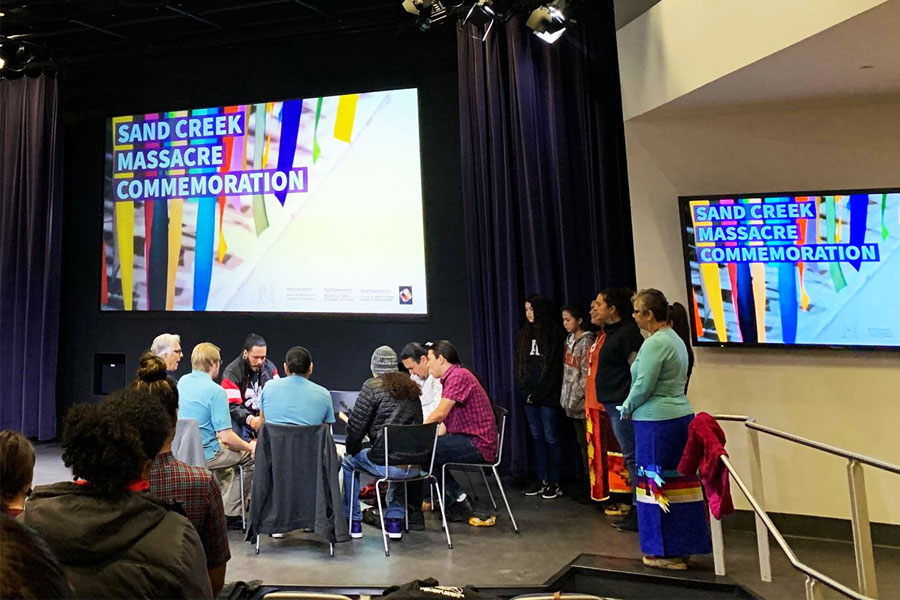Descendants speak on legacy of Sand Creek Massacre at annual commemoration
Maddie Burakoff/Daily Senior Staffer
Redline Singers perform at Northwestern’s sixth annual Sand Creek Massacre Commemoration. At the event, descendants reflected on the legacy of the massacre and tribes’ efforts to heal.
November 17, 2019
As dawn broke on November 29, 1864 — while Northwestern University founder John Evans served as the governor of the Colorado territory — U.S. troops launched an attack on a Native American camp at Sand Creek. Under the direction of Col. John Chivington, the soldiers killed over 200 Cheyenne and Arapaho people, many of them women and children.
Today, indigenous people still feel the effects of that tragedy, which came to be known as the Sand Creek Massacre, said Gail Ridgely, a Northern Arapaho tribal member and descendant of the massacre.
“Today, we’re still healing from this atrocity that happened in 1864,” Ridgely said. “It’s still very real today in our communities.”
Ridgely and other descendants spoke Saturday at Northwestern’s sixth annual Sand Creek Massacre Commemoration, sharing stories about the massacre and discussing the tribes’ efforts to heal. About 70 people gathered in the McCormick Foundation Center for the event, which also included musical performances by the Chicago-based group Redline Singers, a screening of a short documentary and a communal meal.
The Native American and Indigenous Student Alliance hosted the commemoration, co-sponsored by Multicultural Student Affairs, the Office of Institutional Diversity and Inclusion and the Center for Native American and Indigenous Research.
“Given that we’re in an institution that’s somewhat cyclical, where folks are arriving and folks are leaving, it’s just important that we continue to think about this history,” said Aaron Golding, Multicultural Student Affairs assistant director. “In 2013, this memory of John Evans and his involvement in the massacre kind of resurfaced. But in the late 1800s, this was common knowledge.”
NU commissioned its John Evans Study Committee in 2013 to research Evans’ involvement in the Sand Creek Massacre. Their report found that Evans did not directly plan or order the attack but did enact policies that made the massacre possible.
A separate study released by the University of Denver in 2014, however, concluded that Evans was “deeply culpable” for the massacre.
Richard Littlebear — the president of Chief Dull Knife College and a descendant of the Sand Creek Massacre — said it’s essential to preserve the memory of these events, even though they are painful. During the event, Littlebear shared what he called an “expressive writing” about Sand Creek and the soldiers who led the attack.
“Too bad we cannot nonchalantly toss the memory of (Col. Chivington) in the air, skewer it and let it bleed dry on the ground, and then just forget about him,” Littlebear said. “But better to remember the many Cheyenne who died there. Better for all to learn from that horrible experience.”
Littlebear told The Daily that he sees echoes of the massacre in the modern mass shootings, taking the lives of defenseless people.
He said 150 years after the massacre, its effects still feel immediate for many Native Americans.
“For me, it’s especially a heinous crime because it happened here in the United States … which one of its defining principles is that all people are created equal,” Littlebear said. “How can you trample your own central reasons for being?”
Jennie Woodring, a project coordinator in NU’s psychology department, attended the event and said she found very emotional. Woodring said the campus as a whole still doesn’t have a lot of awareness about Sand Creek and its connection to Northwestern.
Woodring herself didn’t know much about the history before working with faculty members and students involved with indigenous groups on campus.
“It does always surprise me that I would say (for) the vast majority of people that work at Northwestern, this isn’t even on their radar,” she said.
Jabbar Bennett, NU’s associate provost and chief diversity officer, said the University is committed to acknowledging its role in the Sand Creek Massacre and figuring out how to support healing efforts moving forward.
Ridgely said he’s grateful for the work that’s been done so far and hopes to continue to work toward “historical remembrance, educational awareness and spiritual healing.”
“I’ll say to our (native) young people, young students: We’re proud of you guys, whatever tribe you are,” he said. “Your skin is brown and beautiful, with blood of warriors that survived genocide and colonialism. Keep your head up.”
Email: [email protected]
Twitter: @madsburk


